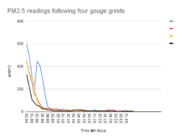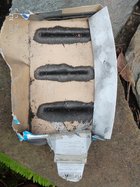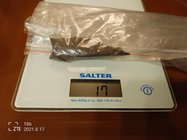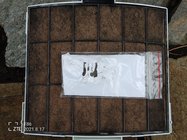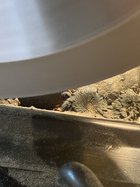I started out with a cheap Woodcraft no name grinder, which was supposed to be 3/4 hp. I don't think it was. After calling Norton and asking them about a 'better' grinding wheel and maybe a diamond wheel, they sent me to a place here in town, Foley Bell Saw, who could make me a CBN wheel. It was 3/16 inch of a matrix bonded to an aluminum hub. I might have been the first turner to have CBN wheels. I ended up getting a Baldor grinder to mount the wheel on. 3/4 hp, and right up to speed. Now, I own mostly D Way wheels which are steel. I consider the 1/2 hp Rikon to be underpowered. For one wheel, they would be sufficient, especially if they are the aluminum hub wheels like Ken Rizza makes. I now have 2 of the 1 hp Rikon grinders for other sets of CBN wheels. They come up to full speed in about 3 seconds, which is the same as my Baldor grinders. When you turn it off, the Rikon takes a long time to stop spinning, far longer than the Baldor grinders. Not really a big issue, because I am in the habit of rounding off the heels of all bevels on my tools, and just hit the bevel on the wheel and it stops really quickly. 2 steel wheels on the 1/2 hp Rikon would be a bit of an overload.
As for which type of wheel, I do not like the radius edged wheels. The thing they are best for is sharpening the small hollowing bits, and that radius edge makes that simpler than with a square edge wheel. Another option on wheels is side grind option. Not some thing I use a lot, but I can see it being handy, especially since I am getting back into flat work. That would be good for plane irons and backs of chisels.
For grits, I would go with 180 if you are getting one wheel. That will do 95% of all the sharpening you will ever do. The rest, mostly skew chisels, can be honed with the small diamond cards, then strop the skew. If you get a second wheel, I would suggest a 600 grit. Some times, especially with punky woods, that 600 grit edge is great for going through that very soft wood without as much tear out.
Another accessory, and I think Ken is the only one to sell them, are 'helical' washers for the grinders. The wheels come spin and bubble balanced, so they run true. The nuts used to secure the wheels to the grinders are not 'precision' made and when you tighten them down, they can induce wobble in your wheel. They come in sets. One is concave, and the other is convex, so when you tighten, they adjust to make up for any unevenness in the nut.
I do rough grind my chisels and plane irons on my CBN wheels. I have been buying some antique planes and refurbishing them. This takes a lot of hand work out of the refurbishing of these old tools. Yes, you can overheat the metal, so care must be taken.
CBN wheels are made for 'hardened' metal. This would include axes, shovel blades, bench plane irons, chisels, and pretty much anything other than old carbon steel. While you can sharpen carbide on them, I do not advise it. I did that once, and while that wheel was on its way out, they never cut the same again. Diamond is for carbide. As an experiment, I took that wheel and loaded it up with copper, brass, aluminum, and carbon steel. Very visible lines on it. It took a month or so of grinding V10 and M42 on it before all visible traces of those metals were gone. I do like to use a tiny bit of lapping fluid on the bevel of my tools when sharpening from time to time. I turn a lot of sloppy wet wood, and that can gunk up your wheels in short order. You can actually soak them in Simple Green or other soaps, then brush them off. I like a plastic bristle brush. I have been told to avoid ammonia as it can bother the plating on the wheels.
robo hippy


